Planning Group Weighs Council Interactions
Ann Arbor planning commission working session (Feb. 4, 2014): Continuing a discussion that began last year, planning commissioners debated two aspects of their bylaws, in preparation for a vote on proposed revisions to those rules at their Feb. 20 meeting.

Ann Arbor planning commissioners Eleanore Adenekan and Jeremy Peters at a Feb. 4, 2014 working session in the basement of city hall. (Photos by the writer.)
Most of their discussion at the Feb. 4 working session focused on how the city council interacts with the commission. The issue stems from an episode last year when councilmember Chuck Warpehoski (Ward 5) began to speak during a public hearing on a project in his neighborhood. He hadn’t been aware of the bylaws governing whether councilmembers can formally address the commission.
A similar situation occurred at an ordinance revisions committee meeting later in the year, when councilmember Sumi Kailasapathy (Ward 1) started to address the commissioners during public commentary. In both cases, the councilmembers were told that the commission’s bylaws prevented them from speaking.
The current bylaws state: “A member of the City Council shall not be heard before the Commission as a petitioner, representative of a petitioner or as a party interested in a petition during the Council member’s term of office.”
Jack Eaton (Ward 4) weighed in during the council’s Feb. 3 meeting, stating his view that if councilmembers are involved in a petition that would prevent them from voting on the item at the council meeting, they should be allowed to address the planning commission. “When we get elected, I don’t think we give up our right to petition government,” he said. Eaton asked Sabra Briere (Ward 1), who serves on the planning commission, to convey his point to commissioners as part of their discussion.
During the working session on Feb. 4, some commissioners expressed concern that any time a councilmember addresses the commission, it can be an undue influence on the process. Another concern is whether councilmembers, by forecasting their view in advance of a council vote, could put the city at legal risk. But at least one commissioner had a different view on the issue of constraining councilmembers from addressing the commission. Eleanore Adenekan told commissioners: “It’s like somebody telling me that ‘You can’t walk into this room because you’re black.’”
There seemed to be general consensus that the current bylaws are unclear, and a proposed revision is intended to simplify the issue: “A member of the City Council shall not be heard before the Commission during the Councilmember’s term in office.”
Briere advocated for additional training of councilmembers, regarding what’s appropriate in these contexts. When the council takes up ethics issues later this year, she said, the issue of communicating with city boards and commissions will be one of the topics. “I call it How to Behave in Public,” Briere said.
Commissioners also discussed revisions to the bylaws related to public hearings. Some of the changes relate to whether someone can speak more than once at the same public hearing, when it is continued over multiple meetings. This situation arose last year during a public hearing on the downtown zoning review. Bonnie Bona cautioned other commissioners against changing the bylaws in ways that are “just making ourselves look more closed.” Some commissioners countered that the bylaws also allow for a majority vote to modify or waive the limitations, if necessary. [.pdf of current planning commission bylaws] [.pdf of Feb. 20 staff memo and proposed revisions]
The commission’s Feb. 20 meeting – held on a Thursday, rather than the typical Tuesday, because of scheduling due to the Presidents Day holiday – has a light agenda. In addition to the bylaws, the only other action item is a proposed rezoning of 2.02 acres at 2225 Traverwood Drive, adjacent to the Stapp Nature Area. Developer Bill Martin is donating the land to the city, and the proposal would rezone it to public land.
Planning Commission Bylaws: Background
The planning commission has been working on revisions to its bylaws for several months. At its July 16, 2013 meeting, the commission approved changes related to the order of agenda items, and the length of time required for special accommodations, such as sign language interpreters. [.pdf of planning commission bylaws]
Other revisions that are being discussed could prove more controversial, and stem from situations that arose at planning commission meetings in 2013.
One possible revision relates to the following clause from the planning commission bylaws, which imposes a limitation on the ability of a councilmember to address the city planning commission:
Section 9. A member of the City Council shall not be heard before the Commission as a petitioner, representative of a petitioner or as a party interested in a petition during the Council member’s term of office.
That part of the bylaws surfaced when councilmembers Chuck Warpehoski (Ward 5) and Sumi Kailasapathy (Ward 1) on separate occasions sought to address the planning commission – Warpehoski, during a public hearing at the commission’s July 16, 2013 meeting, and Kailasapathy on Aug. 13, 2013 during public commentary at an ordinance revisions committee meeting.
An analysis in the Michigan Municipal League’s “Handbook for Municipal Officials” indicates that it be problematic for a city councilmember to address a body like the planning commission. That’s not based on having a property interest in a matter, but rather because the council is the appointing body for the commission. The handbook presents the following scenario as an ethical exercise – using the zoning board of appeals (ZBA). From the MML Handbook:
Situation #2 Before you were elected to the city council you served on your city’s zoning board of appeals (ZBA), so you know the ZBA procedures very well. A few months after your election to council, your neighbor and campaign manager files a petition with the ZBA seeking a variance. Since you know how the ZBA works, he asks you to accompany him to the ZBA and to speak on his behalf. Should you do it?
The analysis offered by the handbook is the following:
No. The Michigan Court of Appeals has labeled this situation as “patently improper” and an abuse of public trust for the reason that the person making the argument to the ZBA is also one of the people charged with appointing the ZBA. This creates duress on the ZBA, raising doubt about the impartiality of the ZBA’s decision. Any decision made by the ZBA under these circumstances is void. See Barkey v. Nick, 11 Mich App 361 (1968).
The implication of the Ann Arbor city planning commission bylaw is that it’s permissible for a city councilmember to address the commission exactly when the councilmember is not the petitioner or does not have an interest in the matter. That situation appears to be explicitly deemed unethical by the MML Handbook, if the handbook’s analysis is extended from the ZBA to the planning commission.
So commissioners are contemplating revisions to the section of its bylaws that address interactions with the city council.
In addition, commissioners are weighing another revision to their bylaws for speaking turns at public hearings. The intent is to clarify how many turns the same person can speak at a public hearing, and how public hearings are continued.
The revisions would clarify a process that was debated by commissioners on Oct. 15, 2013, during the middle of a public hearing on downtown zoning changes. Before that hearing began, planning commission chair Kirk Westphal stated that the hearing would likely continue at a future meeting, but that speakers would be allowed only one turn during the entire hearing – either that night, or at a subsequent meeting. Midway through the hearing, commissioner Sabra Briere raised an objection to Westphal’s ruling, and commissioners spent about 20 minutes debating the issue.
During that debate, planning manager Wendy Rampson reported that the commission’s bylaws are silent on this issue. The commission ultimately voted to allow for people to speak more than once when the public hearing is continued, over the objection of Westphal, Diane Giannola and Wendy Woods.
A proposed revision related to this issue in the bylaws was brought forward by commissioner Jeremy Peters on Nov. 6, 2013, but no vote was taken.
The revisions for both issues – public hearings, and councilmember interactions – were subsequently discussed at a planning commission work session on Jan. 7, 2014. That session was attended by only four of the nine commissioners, however, so the item was put on the agenda again for the Feb. 4 working session.
Interactions with City Council
The discussion of bylaws began on Feb. 4 with a report from Sabra Briere, a Ward 1 councilmember who also serves on the planning commission, regarding issues raised at the previous night’s council meeting on Feb. 3. Jack Eaton (Ward 4) had expressed concerned about whether a councilmember could speak to the planning commission as a whole, Briere said – either on an issue that affects the councilmember directly, or on some general principle.
Specifically, his comments were directed at Article V, Section 9 of the commission’s bylaws:
Section 9. A member of the City Council shall not be heard before the Commission as a petitioner, representative of a petitioner or as a party interested in a petition during the Council member’s term of office.
It was Eaton’s assertion, she said, that councilmembers should be able to address the commission on issues that affect them directly, because they’d need to recuse themselves from voting on the item at council.
[Eaton's remarks at the council table included this statement: "I think that this [Section 9] actually is backwards. I think that if a councilmember has a petition, they should be allowed to speak to the planning commission, just as anybody. When we get elected, I don’t think we give up our right to petition government. And it’s especially true because if we have an interest in a petition, we won’t be able to vote for or against it here at this table. And so there’s no conflict of interest in representing ourselves in front of the planning commission. Conversely, I think that it might be wise to not allow city councilmembers to talk at a commission meeting on a matter that they’ll later have a vote at this table in review of. So I think that Section 9 is exactly opposite. If you have a financial interest in something, you should be able to talk to the planning commission about that matter, because you won’t have a voice here. But if you’re going to vote here [at a council meeting] in review of the planning commission, you probably shouldn’t talk there [before the planning commission].”
Briere said that she’d told Eaton she would bring these issues forward for commissioners to mull over.
In addition, Briere reported that she’d spoken about these issues with Kevin McDonald of the city attorney’s office. “He’s very concerned that councilmembers should never be put in a position of asserting implicitly or explicitly their preconceived idea of how something ought to be that will come in front of them,” she said. If there’s a legal question about whether a vote at council was taken appropriately, she continued, according to McDonald “councilmembers need not to have left a trail of making assertions about what the outcome of the vote ought to be.”
Briere said McDonald’s real concern is if councilmembers were to come before the commission as a petitioner. If they did that, they wouldn’t be able to vote on the issue when it came before council. Briere said that McDonald cited a case involving a councilmember coming before a zoning board of appeals. It’s easy to imagine that a zoning board of appeals or planning commission wouldn’t feel they were making a decision based on the merits, but rather based on the councilmember, she said.
Briere said she’d requested that the council postpone action on the planning commission’s bylaws until its second meeting in March, to give commissioners ample time to discuss these issues.
Interactions with City Council: Having an “Interest”
Briere observed that the issue comes down to the definition of “having an interest.” The situation that precipitated some of this discussion, Briere said, was when Ward 5 councilmember Chuck Warpehoski wanted to address the planning commission about an issue in his neighborhood, which did not affect him directly.
By way of background, both Ward 5 councilmembers – Warpehoski and Mike Anglin – had attended the commission’s July 16, 2013 meeting, which included a site plan for the proposed Glendale Condominiums, to be located at a former orchard south of Jackson Avenue next to the Hillside Terrace retirement community. During a public hearing on the item, Warpehoski began to speak but was cut off by commissioner Diane Giannola, who cited the commission’s bylaws. Warpehoski, who had been unaware of that rule, stepped away from the podium but stayed for the remainder of the public hearing and the commission’s deliberations on this item. He lives in the neighborhood, but did not have a financial interest in the project.
On Feb. 4, Briere said the question was whether it was appropriate for Warpehoski to speak. “Our bylaws suggest he has an interest.”
She added that McDonald was concerned that councilmembers would be influencing the outcome of a decision by another public body.
Giannola advocated for separating whether the councilmember is the petitioner, or just an interested party. “Those are completely different things,” she said.
The real issue is whether a councilmember can speak to the planning commission as a concerned citizen, Giannola said. She felt it was an ethical issue. While it’s not illegal to have a councilmember speak to the planning commission, she added, there are multiple problems with that.
One of the biggest problems is undue influence, Giannola said. The council appoints the planning commission, which in turn makes recommendations to the council. What’s the benefit of councilmembers speaking to commissioners? “Are they intimidating us? Do we have to follow through on what they’re saying? It’s kind of like your boss telling you what you should recommend.”
Giannola said the issue of undue influence is even greater now than it’s been in past years. “Will you be publicly put on the spot or shamed at council,” she asked, “because you disagree with a project that they wanted you to vote a certain way on?”
Another issue is whether planning commissioners should be getting input from councilmembers on a recommendation that the commission is making to council, Giannola said, adding that “it circumvents the process.” The council should wait for the recommendation, she said. Then at the council meeting, they have a “bigger and better platform” to make their views known. The council’s decision “trumps” the planning commission, she added, so there’s no benefit for councilmembers to speak earlier in the process.
Jeremy Peters also raised the issue of process. There’s a standardized process that’s known to the community, he said, with a set role for council. The council takes the recommendation from planning commission, and acts upon it. “To jump in front of that process is arguably a violation of due process,” he said. If someone has a negative response to council’s decision, that could be a legal angle that could be used against the city.
Giannola agreed, saying it was a situation in which the personal desire of a single councilmember could put the city at risk for a lawsuit. There’s no benefit, she added. The only reason for a councilmember to speak to the planning commission early in the process is to try to influence it, or to grandstand, she said.
Eleanore Adenekan was skeptical that anyone on the council could intimidate commissioners – she didn’t view the council that way. A councilmember’s job is to advocate for constituents, she said.
Commissioners then returned to the time when Warpehoski came to the July 2013 commission meeting to speak about the project in his neighborhood. His home wasn’t affected by the development, Briere noted, but he was there “to speak in support of a neighborhood viewpoint.” A councilmember can’t recuse themselves from voting on an item, just because they live in that neighborhood, she added. The only situation in which council rules allow a councilmember to ask for recusal is if they have a direct financial stake in the item, she said.
Wendy Woods, a former councilmember, disputed that characterization. She noted that when she served on council, she recused herself from voting on an African American history museum item because her husband, Ronald Woods, served on the board.
Briere cited a counter-example, when the council wouldn’t agree to let Warpehoski recuse himself from a vote related to the Ann Arbor Transportation Authority, even though his wife – Nancy Shore, director of the getDowntown program – was officially an employee of the AATA. [The meeting that Briere was referring to took place on April 15, 2013. The issue emerged that night during deliberations on revisions to the Ann Arbor Downtown Development Authority, which helps fund the getDowntown program. Warpehoski had read aloud the relevant city charter passage regarding recusal, but no councilmember responded to Warpehoski’s disclosure and no vote was taken to settle the issue.]
Briere noted that attorneys on council don’t vote on items that involve the firms where they work, and she’s been told that she can’t vote on items when her husband, local attorney David Cahill, represents one of the interested parties. But she added that the times when councilmembers can recuse themselves “is really very tight.”
Peters thought that it’s an issue the council needs to take up in a discussion of ethics. It shouldn’t be something the commission deals with in its bylaws. “That debate probably should happen in the open at council – and not here,” he said. If the commission tries to address it in their bylaws, “whatever we end up doing might get misconstrued in the wider community as having some sort of reasoning behind it, other than trying to sort out these legal issues,” he added. The city has previously been threatened with lawsuits surrounding development, Peters observed, and so it should be a wider discussion.
Giannola argued that it should be up to the planning commission to protect its own integrity.
Ken Clein wondered if the constraints on councilmembers would include other forms of communication too, like email or letter. Noting that the council as a whole appoints one of the councilmembers to the planning commission, he also asked why there would be a need for councilmembers to communicate in other ways – given that they had a liaison to the commission already.
Giannola framed the question as one of influence. The form of communication doesn’t matter, she said; “It’s really the influence that’s the problem. It’s not public input, in my mind.”
Bonnie Bona agreed with Peters, saying this isn’t an issue that planning commissioners should be spending their time on.
Woods noted that these bylaws have been in place for years, and if a councilmember comes before the commission to speak, commissioners have the prerogative to point to the bylaws for guidance. The problem is how to interpret the phrase “a party interested in a petition,” she said. To her, that’s something the city’s attorney’s office should decide.
Giannola replied that according to McDonald, it’s up to the planning commission to decide.
Briere noted that prior to 2008, the bylaws of various city commissions, boards and committees did not come to the council for review. In 2008, council passed a resolution requiring that the council see and approve all bylaws. According to Briere, McDonald told her that no one expected the council would edit the bylaws. “It was considered pro forma at the time,” she said, to ensure that all boards and commissions actually had bylaws, and that the bylaws were uniform and consistent. McDonald had told her that the planning commission bylaws were used as a model.
She noted that it’s clear when a councilmember is the petitioner. But “having an interest” is vague – does it mean a financial interest? Is it a political interest?
Briere also reported that she’d raised this issue at the council’s recent administration committee meeting. The message from that committee had been that the planning commission should decide what should be in its bylaws. She noted that bylaws for other commissions and boards have come to council and been approved. “It’s only planning commission where council has balked,” Briere said. [The council has postponed action on the planning commission's bylaws multiple times, because the council wants to delay until the commission votes on its revisions.]
Kirk Westphal described the question as whether to make the language clearer, or to leave it as is.
Briere said it’s the planning commission’s purview to determine its bylaws. She noted that Warpehoski has never asked for a change in the commission’s bylaws, but she added that Jack Eaton (Ward 4) and Sumi Kailasapathy (Ward 1) think it’s an issue that needs to be addressed.
Westphal clarified with Briere that, based on her conversations with McDonald, the usual interpretation of “interest” is financial. Westphal asked whether the existing language helps protect the city, by directing councilmembers not to address the commission.
Giannola contended that in the bylaws, “interest” refers to any interest – not just financial.
Woods suggested language that would make it broader: “A member of the City Council shall not be heard before the Commission during the Councilmember’s term in office.”
Giannola said that’s similar to language in the Ann Arbor historic district commission’s bylaws. City planning manager Wendy Rampson clarified that the HDC bylaws, in fact, state: “Members of the City Council are discouraged from appearing before the Commission as a petitioner, representative of a petitioner or as a party interested in a petition during the Councilmember’s term of office.” [.pdf of full HDC bylaws] Giannola indicated that the bylaws must have been changed since she served on the HDC.
Briere said that as a councilmember, she never felt that she could speak during a meeting of the HDC. She also said she didn’t feel she had the right to address the park advisory commission, even though she might attend meetings and talk to individual PAC members. The same is true for other city boards and commissions, she said. “I never felt that I had an automatic right to address them, even if they were having a lot of public input, because I was not there as a member of the public. I was there as a member of the council – and that means I keep my mouth shut.” [The PAC bylaws do not address the issue of communicating with councilmembers.]
Westphal wondered if the bylaws should be even broader, prohibiting councilmembers from communicating with commissioners. Briere pushed back on that, asking what “communicate” would mean in this context. She said she could imagine a councilmember wanting to ask a question or raise an issue with the commission. It might make sense for a councilmember to meet with the commission’s chair, she said, and in a sense petition the commission to take up an issue.
Giannola argued that it came back to the issue of influence: Should a councilmember be trying to influence the commission in any way?
Clein thought Briere had a point. The commission shouldn’t be building a firewall between the commission and city council. On the other hand, he said, the thing he’d be most concerned about is a councilmember appearing before the commission at a public meeting, as an attempt to influence not just the commission but also the community.
Bona was concerned about councilmembers speaking to commissioners individually. She recalled talking to mayor John Hieftje and telling him that a councilmember had encountered her on the street and talked to her about an issue facing the commission, Hieftje had indicated to her that the councilmember shouldn’t have done that, Bona reported. She thought it was appropriate for Briere, as the city council’s representative on the planning commission, to bring forward any concerns, questions or issues that other councilmembers might have. That approach, coupled with resolutions that the council can pass to communicate with the commission, seemed sufficient, Bona said. “What other communications channels do we need?”
Briere said she wanted to tease apart these issues. If a councilmember addresses the commission at a public meeting regarding a specific action item that the commission will be voting on, “it seems to me that actually is a problem,” Briere said, because councilmembers will be voting on that issue later. She thought it would be difficult to separate the role of the councilmember from the individual person – even if the councilmember stated that he or she was speaking as a private citizen.
The other issue, Briere said, is when councilmembers attend committee meetings of the commission, and speak out on matters that the committee is addressing. She said that when she was first elected, she was told that she shouldn’t forecast how she would be voting on an issue “to the point where my mind is so closed that I can’t accept new information.” Eleanore Adenekan asked if all councilmembers got this same advice. “I can only tell you what I heard,” Briere replied. “I can’t tell you, even if the words were uttered, whether other people heard that. But I did hear it, and understood the rationale behind it.”
Briere said it concerned her that a councilmember could put the city in jeopardy, if someone decides to sue based on a council decision. “They will be able to see that that councilmember’s mind was made up well before … they saw what they were voting on.”
Interactions with City Council: Training
When the council takes up ethics issues later this year, Briere said, the issue of communicating with city boards and commissions will be one of the topics. “I call it How to Behave in Public,” she said.
Bona asked Briere whether she thought the commission should take up the issue of interactions with councilmembers. Briere said her personal feeling is that the current bylaws are fine, “except that we haven’t defined what ‘interest’ is.” Briere said she could tell that some councilmembers would be confused about that. “I got it when I read [the bylaws],” she said. “But I can tell that other councilmembers feel they are being told they are not as able to influence outcomes as they’d like.”
That’s the whole point, Giannola replied. She and Clein both emphasized that in this context, “interest” includes more than just financial interest. It includes influence as well.
Adenekan took a different view: “It’s like somebody telling me that ‘You can’t walk into this room because you’re black.’”
Woods thought the current bylaws are clear to commissioners. But it would be unfortunate to have another situation with a councilmember in front of them wanting to speak, she said. Her recommendation was to use the language she had proposed earlier in the session: “A member of the City Council shall not be heard before the Commission during the Councilmember’s term in office.” Woods noted that this approach doesn’t prevent communication from councilmembers.
Briere said perhaps it’s a matter of training councilmembers about how to interact. “A new councilmember simply isn’t going to have read the bylaws.”
Rampson said she’d make sure to add it to her list of topics to cover when she meets with councilmembers for orientation. She noted that the issue hadn’t previously come up, in her experience.
Giannola then brought up another issue. She recalled an experience she had when she attended a meeting of the park advisory commission, to speak out about an issue that PAC was considering. Councilmember Jane Lumm was at the same meeting, Giannola said, and also addressed PAC – but with a position on the opposite side of the issue. “That would have been fine,” Giannola said, except that Lumm sat behind her, talking with another person about the topic. “It made me really uncomfortable,” she added, and she imagined that someone who wasn’t familiar with the city government would be intimidated. She suggested that councilmembers be told that they can be heard even when they’re in the audience. “They should just sit there and listen,” Giannola said.
Adenekan said she couldn’t imagine being intimidated by a councilmember. Someone jokingly pointed out that it’s because Adenekan is from New York.
Peters said that in the past he’d been scared to speak out at city council meetings. The proceedings are televised and the council chambers are often crowded.
Bona pointed out that when there’s an issue that people feel passionate about, “those who don’t agree feel like they don’t want to speak.”
Adenekan said it’s not like Detroit city council, where someone might try to physically harm you if they don’t agree. In Ann Arbor, “what will they do? Will they throw a knife at you? Will they shoot you?”
Giannola replied that people are scared about being judged, to which Adenekan responded: “Who cares!”
In wrapping up the discussion on this issue, Rampson confirmed with commissioners that she’d include the language that Woods had proposed as a starting point for their Feb. 20 discussion. The change would amend the bylaws to state:
Section 9. A member of the City Council shall not be heard before the Commission during the Councilmember’s term in office.
Bylaws: Public Hearings
The proposed revisions to the bylaws regarding public hearings had been drafted by Jeremy Peters. [.pdf of proposed revisions]
Most of the discussion on Feb. 4 related to these proposed sections:
Section 3. An individual wishing to address the Planning Commission during a public hearings may speak for up to three (3) minutes in total. The first person identifying him/herself as the petitioner, or as a person representing the petitioner, or representing an organized neighborhood group registered with the City of Ann Arbor, may speak for five (5) minutes in total. Subsequent speakers identifying themselves as the petitioner, or as a person representing the petitioner or representing an organized neighborhood group, may speak for three (3) minutes in total. The commission may, by majority vote, modify or waive the limitations made within this section.
…
Section 5. At the discretion of the Chair, or by vote of a majority of the members present, public hearings may be continued to another meeting, but will not be deemed to be a new hearing but a continuation of the original.
Bonnie Bona said she was struggling with it. “This comes up so seldom that I think we’re just making ourselves look more closed.” She understood that the current language isn’t entirely clear, “but I don’t think it matters.” The commission seldom has issues that draw huge crowds over multiple meetings, she noted.
Bona pointed out that the commission had held public hearings over multiple meetings for downtown zoning revisions. At the final meeting on that issue – on Dec. 3, 2013 – few people spoke during the public hearing. “It just proves that we don’t need this,” Bona said.
Peters said the only reason he’d written the revisions this way was to provide clarity, and to be consistent with the city council rules regarding public hearings. It was important for the bylaws to be clear and easy to understand, he added, but it’s a discussion that should happen at one of their regular meetings.
Ken Clein suggested including some explanation – perhaps in a staff memo – to show why the commission is considering these changes. Peters replied that he had proposed a new section with the intent of providing that explanation:
Section 6. The interpretations of the above will be guided by the most recent interpretation of rules for Public Hearings by the Ann Arbor City Council as it pertains to their Rules of the Council, and may from time to time be edited so as to mimic the interpretation and process for Public Hearings in place at meetings of the Ann Arbor City Council.
However, consensus from a previous working session – attended by only four commissioners, on Jan. 7 – was to strike that from the proposed amendments that would be brought forward on Feb. 20.
Kirk Westphal said there was some merit in being more restrictive but clear in the bylaws, and knowing that commissioners have the option of being less restrictive if the situation calls for it. A proposed addition to the bylaws would address this: “The commission may, by majority vote, modify or waive the limitations made within this section.”
Sabra Briere reported that she’s heard from people in the community who believe that the commission had wanted to limit public input. She noted that at the city council, there’s an ongoing record of who has spoken during public hearings. The goal is that no one person should come back three or four times to say the same thing on the same issue. “Not only does that feel like it’s a waste of time,” she said, “but it feels as if that person’s individual voice may sound more powerful than someone else who’s only spoken once.”
Briere noted that some people do speak multiple times, and they think that it’s standard practice. She wondered if there would be a way to keep track of the speakers at the commission’s public hearings.
Briere also highlighted the proposed revisions that state: “An individual wishing to address the Planning Commission during a public hearings may speak for up to three (3) minutes in total.” Does that mean that someone could speak for a minute, then come back later in the same hearing and speak for another two minutes? Planning manager Wendy Rampson noted that the council rules use the same language, and no one tries to break up their speaking turn in that way.
Rampson also pointed out that in the past, the planning commission has allowed people to speak again at a public hearing if the item is postponed. The rationale is that if an item is postponed, it’s for a reason, she said – and that when it comes back to the commission, changes might have been made.
She said that if the commission approves these changes to its bylaws, there are several administrative things that can be done to make it clear that people can only speak once per hearing. She suggested adding a sentence to the text that the chair typically reads before a public hearing, laying the ground rules.
Next Steps
The proposed revisions to the planning commission’s bylaws will be on the agenda for the Feb. 20 meeting. [.pdf of staff memo and proposed revisions] The meeting is being held on a Thursday because of scheduling changes related to the Presidents Day holiday.
If approved by commissioners, the bylaws revisions will be forwarded to the city council for approval.
Present: Eleanore Adenekan, Bonnie Bona, Sabra Briere, Diane Giannola, Ken Clein, Jeremy Peters, Kirk Westphal, Wendy Woods. Also: City planning manager Wendy Rampson.
Absent: Paras Parekh.
Next meeting: Thursday, Feb. 20, 2014 at 7 p.m. in the second floor council chambers at city hall, 301 E. Huron St., Ann Arbor. [Check Chronicle event listings to confirm date]
The Chronicle survives in part through regular voluntary subscriptions to support our coverage of publicly-funded entities like the city’s planning commission. If you’re already supporting The Chronicle, please encourage your friends, neighbors and coworkers to do the same. Click this link for details: Subscribe to The Chronicle.




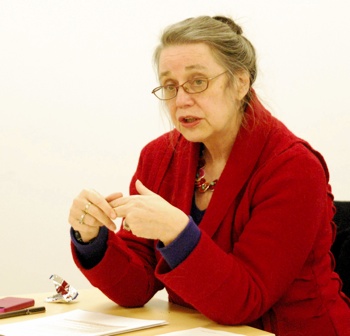
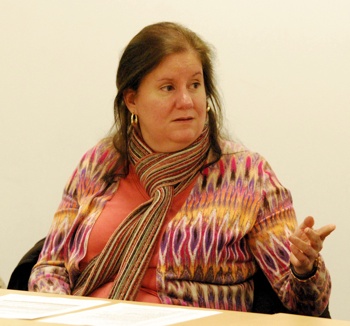
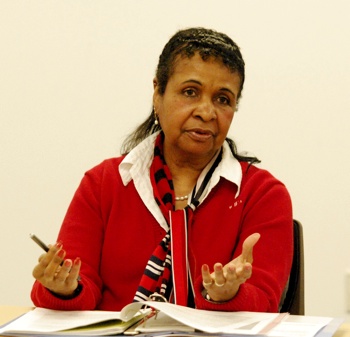
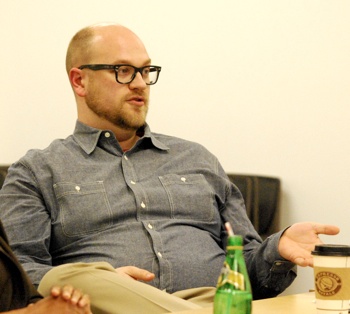
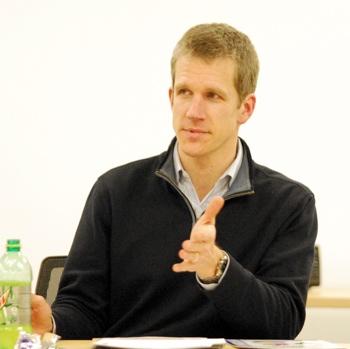

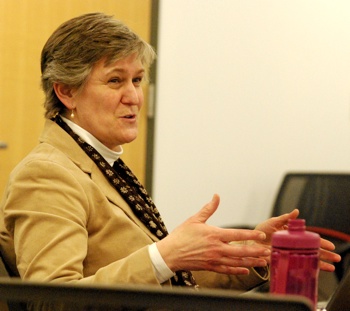
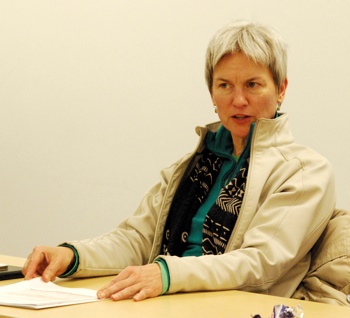
I have to say that I agree with the general principle that councilmembers should not address the Planning Commission (on any basis). Where they are supporting a neighborhood group, they might appear in the audience.
I’m with Kevin McDonald on this. Councilmembers will have a vote, and a chance to debate, the project at the Council meeting. But their view on the project should not be anticipated by a comment to the Commission. In theory, councilmembers should be able to make a decision at council on the merits, including a review of the Planning Commission’s deliberation. Actually, there will be simple opinion weighing in. Councilmembers certainly should support constituents when a judgment is to be made, and Council has often overturned (or ignored) Planning Commission recommendations. But that should happen at the Council table.
In general, I agree with what Vivienne Armentrout says in comment 1. The current rule does not accomplish that purpose. Instead, the current rule seems to say that if a Council member has a financial interest in a project, he or she cannot speak on behalf of that project. That implies that the Council member can speak in other instances.
I believe that, at a minimum, a Council member should not speak at Planning Commission on a matter which will come before Council. Let the Planning Commission come to its own conclusions and make its own recommendations to Council without Council members trying to influence the Commission’s recommendations.
This is not a new question. In the past, former Council member Leigh Greden appeared before the Planning Commission to lobby for the ability of PUD developers to make a payment in lieu of providing affordable housing. A couple of years ago, the Mayor appeared before the Parks Advisory Commission to ask them to modify the content of a proposed resolution regarding the plan to build a UM parking structure on Fuller Road parkland. Council members speaking to Boards and Commissions appointed by Council about matters that will come before Council is not a new phenomenon.
On the other hand, whether a Council member is allowed to speak on his or her own behalf regarding a project or site plan he or she is proposing is different. The project or plan will come before the Council, but the Council member with a financial interest in that plan will not participate in the Council’s deliberations. If a Council member is the developer proposing a plan to the Planning Commission, I don’t think it will be a secret that the interested Council member will favor approval of the plan. Gagging the Council member does not change the potential influence he or she may have.
Imagine a site plan proposed by a Council member coming before the Planning Commission. Although the Council member will not be allowed to speak in favor of his or her own project, he or she will be present while project managers and lawyers speak on the Council member’s behalf. How does gagging the Council member reduce the supposed influence that might arise if he or she actually uttered words in favor of the project?
Whether Council members are ever allowed to speak to the Planning Commission is less important than crafting a rule that is easily understood by lay people. The phrase “a party interested in a petition” should be interpreted to mean more than having a passing interest in a subject. Who would speak on a topic that he or she found uninteresting? The fact that there could be two interpretations of that phrase means it needs to be replaced with something less likely to cause disagreement.
A more recent example of a councilmember addressing the park advisory commission occurred at PAC’s Nov. 19, 2013 meeting, when Jane Lumm (Ward 2) attended to advocate that commissioners reconsider a recommendation related to the location of tennis courts at Windemere Park. This is a different instance than the one mentioned by planning commissioner Diane Giannola during the Feb. 4 working session.
As mentioned in the report above, the PAC bylaws do not address the issue of communicating with councilmembers. [.pdf of PAC bylaws]
Did the Windemere Park action go to the Council? I’m thinking that not all PAC decisions go to Council, unless they meet certain monetary or legal thresholds.
Re: (3), Mary, I did not mean to suggest that the Parks Advisory Commission has a rule against Council members speaking to the PAC. But, the Michigan Municipal League’s advisory example noted in the article suggest that Council members should never speak to any body composed of positions appointed by the Council. It is that view that makes appearing before the Planning Commission equivalent to appearing before PAC.
I would also note that the citation given for Barkey v. Nick, 11 Mich App 361 (1968) is wrong. the correct cite is 11 Mich App 381. A subsequent Court of Appeals case [DOT v Twp. of Kochville, 261 Mich App 399, 404 (2004)] described the holding in Barkey as such:
Later in the opinion, the Court continued:
Re. “Did the Windemere Park action go to the Council?” The council will be asked to approve a construction contract for the project, which is currently out for bids. According to Colin Smith, parks & recreation manager, the item will likely be on the council’s agenda in April.
Well, assuming that the placement of the tennis court was not in the Council’s decision power, appearing before the PAC to discuss placement was not the same case as with Planning Commission proceedings where Council has its turn. I suppose a councilmember could oppose the construction contract as a means of blocking the placement, but that seems a move that would not be well received.